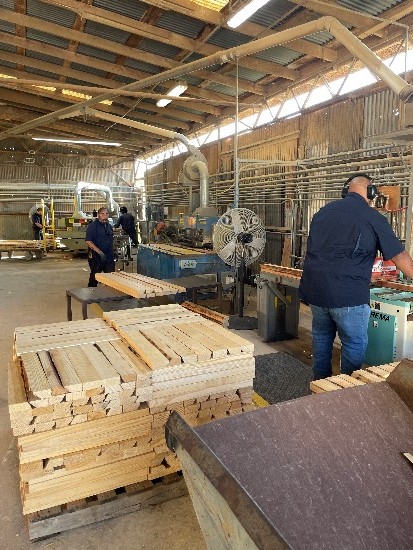Duderstadt Stake is a small, family-owned manufacturing company, providing quality wooden
stakes for construction, survey, and garden use. After returning from WWII, Wilmer Duderstadt
opened a surveying retail store in San Antonio, using his skills developed in optics during the war.
He went on to open the stake-making operation in the 1960’s on his ranch property outside
Elmendorf, TX. Today, Duderstadt Stake’s crew of about 20 focus on quality wooden stakes that
won’t break or splinter when used to mark out sites in preparation for construction projects. They
provide both standard and non-standard sized stakes to better fit the work site and project type.

The Situation

Over the years, Duderstadt Stake traditionally worked in batches and, although successful, Duderstadt realized that to remain competitive, practices needed to be updated. In batch processing, excess inventory often leads to significant waste as large quantities of products pile up between production stages, creating unnecessary movement and transportation. This accumulation complicated material handling, as workers navigated around excess stock, and resulted in delays, increased labor costs, and longer lead times. Together, these inefficiencies hindered overall productivity and responsiveness to customer demands, ultimately impacting the facility’s bottom line.
The Solution
To address the operational challenges and inefficiencies, the management team at Duderstadt, with the expertise and guidance of TMAC (Texas Manufacturing Assistance Center), decided to implement a one-piece flow system. The goal was to streamline production, reduce waste, and enhance product quality by eliminating the delays and inefficiencies that were inherent in the batch system. The decision to shift to a continuous flow model was driven by the need for greater flexibility and responsiveness in an increasingly competitive market.
The transition to one-piece flow began with a comprehensive assessment of the existing workflow. The management team and the TMAC consultant conducted a thorough analysis of the factory’s production process, carefully mapping out each step involved. This process helped the team identify bottlenecks.
Once the bottlenecks and areas of improvement were pinpointed, the design of workstations was reevaluated to ensure that each operator had the necessary tools, resources, and space to efficiently process individual units. In some areas, workstations were reconfigured to bring operations closer together, reducing the time and effort it took for workers to pass materials or parts between steps.
The process redesign wasn’t limited to physical changes on the factory floor. Employee involvement and input were central to the process. Training sessions were organized to ensure that every employee understood the core principles of one-piece flow and their role in the new system. The training emphasized the importance of reducing waste, in line with Lean manufacturing principles. Armed with this new knowledge, workers, who best understood the challenges and inefficiencies of the existing system, provided invaluable feedback on making the new system work.

The Results

The results were impressive. Within just a few months, production efficiency increased by over 400%. By minimizing waiting times, reducing inventory, and empowering employees to take ownership of their work, Duderstadt was able to not only optimize its manufacturing processes but also create a more engaged and motivated workforce. The result was a smoother, faster, and more responsive production system that allowed the company to meet customer demands more effectively, improve its competitive position, and position itself for future growth.
- Over 400% increase in production efficiency
- Over 25% reduction in work in progress inventory
Working with TMAC has been one of the most beneficial business actions we have ever taken. With Sandra’s support and guidance, we were able to take a process that took 3-4 days down to less than 8 hours to produce the same results. We couldn’t ask for better partners in Leaning our processes and elevating our business.
Tonia Carlson-Harris
People and Organization Development








